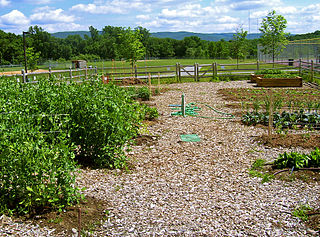This article does not cite any sources .(December 2009) (Learn how and when to remove this template message) |
Western Plant Health Association is a nonprofit trade organization that represents the interests of fertilizer and crop protection manufacturers, biotechnology providers, distributors and retailers in California, Arizona and Hawaii, according to President Renee Pinel. Trade members comprise more than 90 percent of all the companies marketing commercial fertilizers, soil amendments, agricultural minerals and crop protection products in these three states. The association operates two Web sites: www.healthyplants.org, and www.calfertilizer.org. The association is one of the largest agricultural trade associations on the West Coast of the United States.

A fertilizer or fertiliser is any material of natural or synthetic origin that is applied to soils or to plant tissues to supply one or more plant nutrients essential to the growth of plants. Many sources of fertilizer exist, both natural and industrially produced.
Crop protection is the science and practice of managing plant diseases, weeds and other pests that damage agricultural crops and forestry. Agricultural crops include field crops, vegetable crops and fruits. The crops in field are exposed to many factor. The crop plants may be damaged by insects, birds, rodents, bacteria, etc. Crop protection encompasses:

Biotechnology is the broad area of biology involving living systems and organisms to develop or make products, or "any technological application that uses biological systems, living organisms, or derivatives thereof, to make or modify products or processes for specific use". Depending on the tools and applications, it often overlaps with the (related) fields of molecular biology, bio-engineering, biomedical engineering, biomanufacturing, molecular engineering, etc.
WPHA members support a variety of educational and research programs to ensure that all fertilizer and crop protection products are used in an environmentally sound way. WPHA-sponsored stewardship programs include: the California Department of Food and Agriculture's Fertilizer Research and Education program; the Coalition for Urban Renewal and Stewardship (CURES); the Anhydrous Ammonia Transportation Safety Program; and several worker protection projects as well as educational training and certification programs offered via the Internet and through trade media. WPHA also conducts recruiting events to persuade students to consider careers in agriculture by offering annual student dinners at campuses throughout California.

Education is the process of facilitating learning, or the acquisition of knowledge, skills, values, beliefs, and habits. Educational methods include storytelling, discussion, teaching, training, and directed research. Education frequently takes place under the guidance of educators and also learners may also educate themselves. Education can take place in formal or informal settings and any experience that has a formative effect on the way one thinks, feels, or acts may be considered educational. The methodology of teaching is called pedagogy.
A research program is a professional network of scientists conducting basic research. The term was used by philosopher of science Imre Lakatos to blend and revise the normative model of science offered by Karl Popper's falsificationism and the descriptive model of science offered by Thomas Kuhn's normal science. Lakatos found falsificationism impractical and often not practiced, and found normal science—where a paradigm of science, mimicking an exemplar, extinguishes differing perspectives—more monopolistic than actual.
Stewardship is an ethic that embodies the responsible planning and management of resources. The concepts of stewardship can be applied to the environment and nature, economics, health, property, information, theology, etc.
The California Fertilizer Foundation is also overseen and managed by the Western Plant Health Association. One of the Foundation's key functions is raising money to finance annual school garden grants for 24 elementary school campuses in California. The grants are $1,200 each and subsidize the creation of school gardens with the intention of teaching students to understand the value of plant nutrition and to appreciate all the work that goes into farming to keep the U.S. and the world stocked with a plentiful supply of safe and affordable food, while preventing possible harmful environmental impacts.

Plant nutrition is the study of the chemical elements and compounds necessary for plant growth, plant metabolism and their external supply. In 1972, Emanuel Epstein defined two criteria for an element to be essential for plant growth:
- in its absence the plant is unable to complete a normal life cycle.
- or that the element is part of some essential plant constituent or metabolite.

Environmental degradation is the deterioration of the environment through depletion of resources such as air, water and soil; the destruction of ecosystems; habitat destruction; the extinction of wildlife; and pollution. It is defined as any change or disturbance to the environment perceived to be deleterious or undesirable. As indicated by the I=PAT equation, environmental impact (I) or degradation is caused by the combination of an already very large and increasing human population (P), continually increasing economic growth or per capita affluence (A), and the application of resource-depleting and polluting technology (T).












